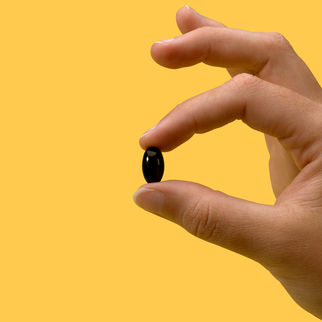Welcome to the fascinating world of protein, the essential nutrient that powers our muscles' recovery process and ensures optimal health. As we dive into the complexities of protein, we’ll discuss why protein is so important, how much you need each day, and where you can get it. Let’s get started.
How Does Protein Support Muscle Health?
Protein is a key player in the construction and repair of our cells, tissues, and organs. It's the star performer when it comes to maintaining muscle strength and resilience, which is why it’s so important for muscle recovery.
However, this versatile nutrient doesn't stop there. It also produces essential hormones and enzymes, maintains fluid and electrolyte balance, and contributes to our immune response. When you think about it, protein is a multitasking maestro for our bodies.
The role of protein in muscle recovery becomes particularly interesting when we consider how it responds to exercise.
Those moments of post-workout muscle soreness? That's your body indicating it's repairing the micro-damage caused to muscle tissues during your workout. And this is where protein comes in, acting as the restorative force, repairing and fortifying your muscles.
However, protein doesn't carry this responsibility alone. Its partners in the journey towards optimal recovery are the other macronutrients – carbohydrates and fats.
Consumed together after a workout, carbohydrates replenish the energy stores in your muscles, while protein takes care of tissue repair and growth. This winning combination ensures your post-exercise recovery is both quicker and more effective.
Why Is Protein Important for Muscle Recovery?

So what makes protein so effective in muscle recovery? The answer lies in its basic building blocks – amino acids.
There are two primary types of amino acids – essential, which we obtain from our diet, and non-essential, which our bodies can produce.
Essential amino acids are particularly critical in muscle recovery as they provide the necessary material for repairing exercise-induced muscle damage, encouraging growth, and reducing muscle soreness.
The absorption of these vital amino acids and their subsequent use is a process finely tuned to be efficient. This allows the dietary protein we consume to be put to best use throughout the body, including in muscle recovery and promoting athletic performance.
How Does Protein Support Muscle Growth?
One of the most significant ways protein promotes muscle recovery is through initiating muscle protein synthesis (MPS), which is the process of building new muscle tissue. The more MPS your body undertakes, the more your muscles grow and recover.
We can dive even deeper into this process by looking at myofibrillar protein synthesis, a subset of MPS. This synthesis focuses specifically on muscle fibers, directly influencing both muscle strength and size.
Getting the right balance between protein intake and MPS is essential. Consuming enough high-quality protein promotes MPS and optimizes muscle recovery. However, there is no benefit to overdoing it – moderation is key.
This is where the value of resistance exercise becomes apparent. Resistance training is a perfect partner for protein, enhancing its effectiveness, encouraging muscle growth, and aiding recovery.
So next time you finish a resistance training session, why not celebrate with a protein-packed meal to give your muscles some help?
What's the Relationship Between Protein and Glycogen Stores?
The multifaceted relationship between protein and glycogen stores adds another dimension to our understanding of post-exercise recovery.
Glycogen, a form of carbohydrate stored in our muscles and liver, is the main fuel source during strenuous exercise. Once these glycogen stores are depleted, our performance can take a hit — and that's where our dependable friend protein comes in, assisting in the replenishment of glycogen.
As mentioned earlier, combining protein with carbohydrates post-exercise creates a winning combo for restoring glycogen stores. This combination prompts a healthy insulin response, which in turn supports the rate at which glycogen is produced.
For athletes or fitness enthusiasts who engage in high-intensity workouts, this is particularly crucial, given the rate at which glycogen stores are depleted during such sessions.
What Are the Best Sources of Protein for Post-Workout Recovery?
Now that we understand protein's role in muscle recovery and glycogen replenishment, let's dive into the best sources of protein for post-workout recovery.
In the world of protein supplements, two popular contenders are whey and casein protein powders:
- Whey protein is rapidly digested and quickly spikes muscle protein synthesis, making it ideal for post-workout consumption.
- Casein protein, on the other hand, is more slowly digested and provides a sustained release of amino acids, which can help prevent muscle breakdown over a longer period.
In the realm of plant-based proteins, options like soy, pea, and hemp provide a comprehensive amino acid profile, making them effective for muscle recovery. However, to maximize protein synthesis, a balanced approach that includes a mix of both plant and animal proteins might be best.
The debate between protein shakes and whole foods often boils down to convenience versus nutrient variety.
Protein shakes offer a quick and easy way to ingest high-quality protein, particularly handy post-exercise. Whole foods, however, provide a broad spectrum of other nutrients and dietary fibers, supporting overall health and well-being.
As you can see, there is a wide variety of options available to help you get enough protein. Ultimately, it will be up to you to decide which is the best for you, as each source is capable of giving your muscles the protein they need to grow.
How Much Protein Do You Need for Optimal Muscle Recovery?

Determining the optimal amount of protein intake for muscle recovery requires careful consideration of your body weight, training intensity, and goals.
A commonly cited guideline is to consume around 0.8 to 2.0 grams of protein per kilogram of body weight daily, depending on your level of physical activity. Strength training and resistance exercises may demand the higher end of this range to support muscle repair and growth.
The timing of protein ingestion is another factor to consider. Consuming protein within two hours post-workout can maximize muscle protein synthesis and enhance recovery. But remember, it's not just about post-exercise protein. A balanced intake of protein throughout the day, coupled with a sufficient pre-workout protein intake, can also positively influence your training outcomes.
Opt for high-quality proteins that provide essential amino acids, and consider wholegrain foods to complement your protein intake with necessary carbohydrates.
Remember, you're unique, and your nutritional strategy should be too. From building muscle mass to reducing muscle soreness, protein is your ally on your path to wellness and improved athletic performance.
What Role Do Supplements Play in Muscle Recovery?
When it comes to muscle recovery, certain supplements can indeed be helpful. One such supplement is, you guessed it, protein.
Protein supplementation can be a convenient and efficient way to ensure you're meeting your protein needs, particularly in periods of intense training or when whole-food options aren't readily available.
Other supplements, like electrolytes, play crucial roles in muscle function and recovery. Electrolytes, such as potassium and sodium, help maintain fluid balance, nerve function, and muscle contractions. Replenishing these electrolytes post-workout can aid hydration and prevent muscle cramping.
Omega-3 supplements, like ours here at iwi life, can also be beneficial for supporting your muscles. Our supplements are rich in docosahexaenoic acid (DHA), which is associated with muscle recovery. Just one softgel a day is all it takes to give your muscles the support they need.
Are There Any Precautions or Downsides to Increased Protein Intake?
As with most things, though, balance is key when it comes to protein intake. High-protein diets are generally safe for healthy individuals, but excessively high protein intake could potentially strain the kidneys over time, particularly in those with pre-existing conditions.
In terms of fitness goals, there's a balance to be struck between using protein for muscle strength and weight loss. High protein diets can support muscle mass and also aid in weight loss due to their satiating effect, but it's important to ensure you're consuming a balanced diet overall.
Understanding exercise-induced muscle damage can further guide your protein strategy. While some muscle damage is a normal response to resistance and strength training, excessive protein won't necessarily speed up recovery from severe damage. In cases of intense or prolonged muscle soreness, it's advisable to seek medical advice.
The Bottom Line
Protein, with its role in muscle repair, growth, and strength, is a key player in your post-workout recovery strategy. Ensuring you incorporate quality protein in your sports nutrition routine can support not only your recovery but also your overall performance.
As a final thought, don't forget that while protein is essential, it's just one part of a broader wellness strategy. A balanced diet, adequate hydration, regular exercise, and sufficient rest are all important.
Additionally, consider incorporating beneficial supplements like iwi life's omega-3 products to further support your muscle recovery and overall health. After all, you're not just training for today, but for a healthier and stronger tomorrow.
Sources:
Dietary Protein and Muscle Mass: Translating Science to Application and Health Benefit | PMC
Macronutrients and Human Health for the 21st Century | PMC
Amino Acids | MedlinePlus Medical Encyclopedia
Muscle Protein Synthesis | Physiopedia
Muscle Protein Synthesis in Response to Nutrition and Exercise | PMC
Glycogen: What It Is & Function | Cleveland Clinic
Casein Protein Supplementation in Trained Men and Women: Morning versus Evening | PMC



















